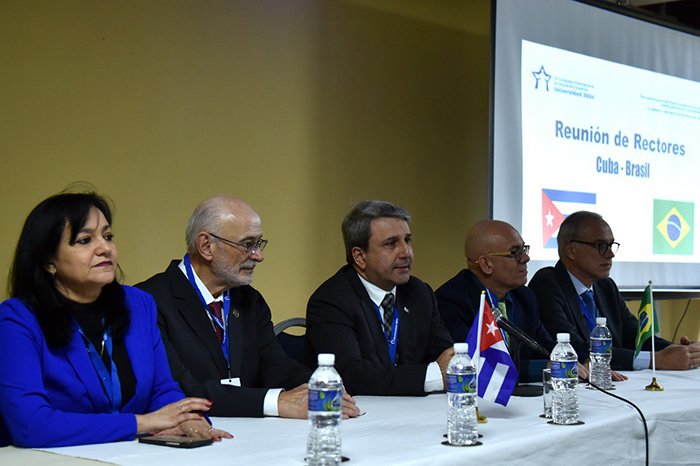
HAVANA, Feb 8 (NNN-ACN) — Cuba and Brazil strengthened bilateral cooperation in Higher Education after signing 28 accords, two MOUs and a letter of intention between 17 Cuban and 14 Brazilian universities and the International Cooperation Group of Brazilian Universities (GCUB).
The accords were signed during a meeting of university rectors at Havana’s 14 Universidad 2024 International Higher Education Congress.
The cooperation agreements include joint research projects, institutional collaboration projects as well as the exchange of scientific and social information and publications. Also included is the exchange of professors, researchers and the planning of courses, lectures and seminars among other events in the interest of both sides.
Cuban Higher Education Minister Walter Baluja said that the current International Congress extends a bridge between Cuba and Brazil and helps the exchange of and collaboration with the promotion of accords, scientific and academic exchange.
Meanwhile, the 14th International Congress of Higher Education Universidad 2024 hosted today, on its second day of work, the Cuba-Russia Forum, with which both nations will strengthen collaboration in Higher Education.
Walter Baluja, Cuban Minister of Higher Education, said that Cuban-Russian cooperation has allowed for closer ties between the universities of both countries and, consequently, their communities of professors and students.
Relations in education have grown in recent years and we are in a position to make them broader and more relevant, even though we are geographically distant, he said.
It is necessary to multiply projects and open up the spectrum of collaborations between the houses of higher learning that also strengthen cultural ties, added the head of the institution.
Regarding the current approach to higher education in the two countries and the prospects for exchange in the university field, Irina Kraeva, rector of the Moscow State Linguistic University, pointed out that the University Congress is an ideal platform to strengthen those links that have historically united this European nation with the Caribbean country.
In this conclave, collaboration projects are created for the future of university education and, therefore, for the prosperity of our nations, Kraeva said.
According to the rector, Russia and Cuba have many common tasks and approaches in education, since in both countries this area is a priority for the fulfillment of the Sustainable Development Goals contained in the United Nations 2030 Agenda.
Relations in education between the Caribbean nation and Russia have allowed transformations in areas such as digitization, artificial intelligence and innovation, through scientific research and contributions to social accompaniment, Kraeva remarked.
Reynaldo Velazquez, Cuban deputy minister of higher education, stressed that the forum held Tuesday showed the Russian-Cuban collaboration for several decades, which has produced about 16,000 graduates of the European country’s institutions.
Velazquez pointed out that these bilateral ties have also allowed for the granting of a hundred scholarships to Cuban professionals, through which more than 400 students have graduated.
Within the framework of the Cuba-Russia Forum, held during Universidad 2024, 24 agreements were signed in addition to another 100 existing ones to transform higher education in both nations. — NNN-ACN






